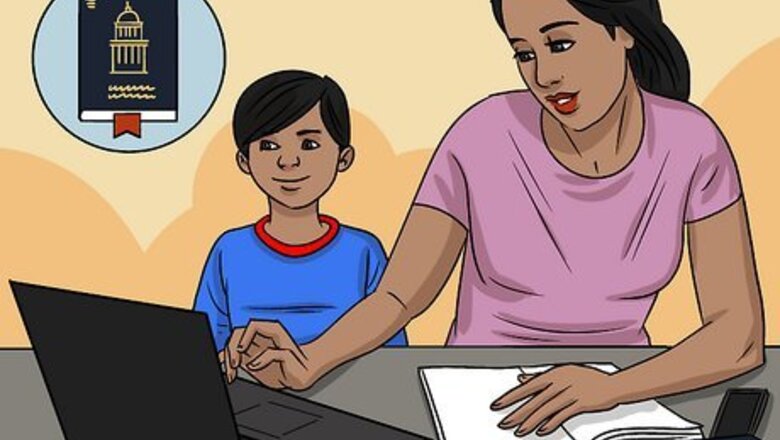
views
Getting Over the Initial Hurdles
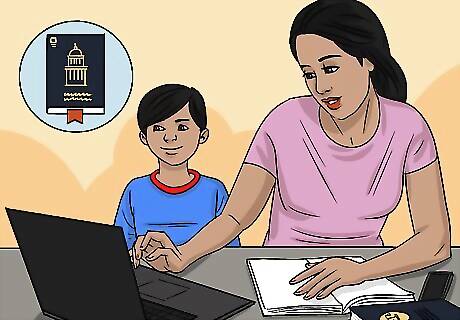
Establish your home education legally. In the US, each state has different laws and regulations regarding home-school. Generally speaking, New England has the most stringent requirements. Before you jump in, research your state's laws and give them the required notice, in addition to making a checklist of future deadlines for yourself (if applicable). Since home educators have a personal investment in ensuring they understand the homeschooling laws correctly, local support groups are often the best resource to steer you to the most accurate legal information in your area. Be advised that the legal requirements for home educators vary by country, state, and even sometimes by school district, so a bit of research will be required. HSLDA and A to Z Home’s Cool provide useful guides to what it means to home-educate legally (see external links below). You may be required to keep a portfolio of your children's work. It is very important to do this from day one if required by your state.
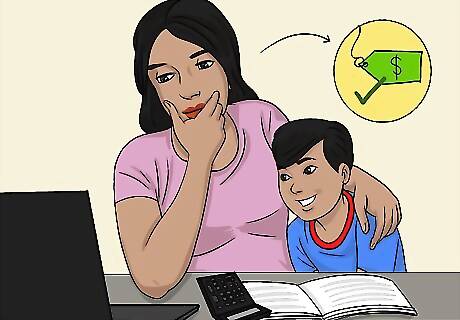
Make sure it's financially doable. Depending on your take of "homeschooling," the amount of money you'll be investing in your child can vary greatly. The job can be done with $300 or it can be done with $2,500. It all depends on what supplies you'll be using and activities you plan on doing. Activities, unfortunately, aren't always free. In order to get the best of the world (and learn more while they're at it), you could supplement their lessons with trips to planetariums, art exhibits, lectures, showcases, nature preserves and the like -- but these things can cost money. For the record, those two figures mentioned above represent the ends of the average home-schooling spectrum.

Enroll your child in community activities. Get them involved in some kind of sport or other activity that they like; your child will need social interaction and time spent away from home. Don't force them to do anything, but don't let them give up too easily, either. These activities get children to socialize and also teach important life skills such as making friends and keeping commitments. Homeschooling your child will not "ruin" them. As long as you make sure their emotional, social, mental, and physical needs are met, they'll be successful adults in the future. Ask them what activities they'd like to do that span their interests and get them started on the right path. Research says home-schoolers are just as involved as their publicly-schooled peers. They help the community and can make just as many social connections. EXPERT TIP Rebecca Tenzer, MAT, MA, LCSW, CCTP, CGCS, CCATP, CCFP Rebecca Tenzer, MAT, MA, LCSW, CCTP, CGCS, CCATP, CCFP Clinical Therapist & Adjunct Professor Rebecca Tenzer is the owner and head clinician at Astute Counseling Services, a private counseling practice in Chicago, Illinois. With over 18 years of clinical and educational experience in the field of mental health, Rebecca specializes in the treatment of depression, anxiety, panic, trauma, grief, interpersonal relationships using a combination of Cognitive Behavioral therapy, Psychodynamic therapy, and other evidence-based practices. Rebecca holds a Bachelor of Arts (BA) in Sociology and Anthropology from DePauw University, a Master in Teaching (MAT) from Dominican University, and a Master of Social Work (MSW) from the University of Chicago. Rebecca has served as a member of the AmeriCorps and is also a Professor of Psychology at the collegiate level. Rebecca is trained as a Cognitive Behavioral Therapist (CBT), a Certified Clinical Trauma Professional (CCTP), a Certified Grief Counseling Specialist (CGCS), a Clinical Anxiety Treatment Professional (CCATP), and a Certified Compassion Fatigue Professional (CCFP). Rebecca is also a member of the Cognitive Behavioral Therapy Society of America and The National Association of Social Workers. Rebecca Tenzer, MAT, MA, LCSW, CCTP, CGCS, CCATP, CCFP Rebecca Tenzer, MAT, MA, LCSW, CCTP, CGCS, CCATP, CCFP Clinical Therapist & Adjunct Professor Homeschooled kids stay social through co-ops and events. Homeschooled kids can stay social and make friends by joining homeschool co-ops, doing extracurriculars, volunteering in the community, using online homeschool communities, and going to local events. Libraries and sports leagues are great places to meet other kids your age, too.

Inform extended family. Others in your family who care about you and your children can be helpful and give great support to your home education efforts -- or they can be heartbreaking critics. Plan how you will tell them what you are planning to do, listen to their responses, and answer questions and concerns they may have. Help them understand that you are prepared and determined, and don't let any negative attitudes get you down. They care, and over time as your children show success in their education at home, they very well may come around and be your greatest supporters. In fact, why can't they aid in helping your children learn? Surely they have areas of expertise that you don't. Let them know you want them to be a part of your child's life, too -- how could they possibly turn it down?
Your Teaching Approach

Be confident in your teaching abilities. Realize that you care about your child's future more than anyone else does. Therefore, you are uniquely qualified for the role of homeschooling parent. Homeschooling is a big responsibility, but if you mold it to your family lifestyle it can work well -- regardless of your education or expertise. It does not require you to give up the rest of your interests; you can still have a life outside of homeschool. While it's pretty easy to get a child through grade school, you may find it's harder to be confident in yourself when it comes to putting them through high school. But it is doable and people have done it. Just know that you'll be learning, too!

Learn about different home education methods. Different styles abound and can be learned from and used as resources. The schools of thought vary widely when it comes to this topic, so it's best to sit down and find where you fall on the spectrum of belief yourself. Unschooling: This is an anarchic approach where the student is self-directed. It's based on the idea that a student is likely to learn quickly and easily when they study things they are interested in. Diane Lockman offers an approach geared towards reading, thinking, and communicating, with a heavy Christian emphasis. She even offers online high school courses. Unit studies -- where each unit is dedicated to a different topic. You can often find units (and other varied curricula) online. Charlotte Mason’s methodology is a little less conventional and focuses on "atmosphere, discipline, and life. Montessori or Waldorf methods, where the child is more independent and "discovers" rather than is told. An eclectic blend of different styles A complete online curriculum package like Global Student Network A private online school like International Virtual Learning Academy

Determine your own style of home education. Examine your own intentions and motivations. Why do you want to home educate? What do you consider a ‘good’ education? What do you believe about children, teaching, and learning? How do your children seem to learn best? These questions can help you determine what approach to take and help you create a learning environment that will be best for your family and your children. Consider, too, that an approach that works for one child may not be best for another. In addition, what you may prefer may not be best for them. Talk to your child about their expectations before you go about outlining the year.

Plan your curriculum. The enormous volume of material and methods that are available can be overwhelming for a new homeschooling parent. It's easy to forget how useful it all is! Identifying your approach will be the first step in narrowing things down. There are many resources to help you navigate through the maze of ideas. Research, read, and plan what you want to teach and how. Libraries and bookstores have books on home education methods, experiences, and proven curricula. The internet offers a never-ending source of information as well: basic information on various subjects, online purchase of curricula and supplies, articles about methodologies, support groups, and public school curricula. It even has free lessons on most subjects from teachers, other home educators, and even television stations. Authentic classical education involves teaching reading, thinking, and speaking to substantial mastery. However, Unschoolers, while agreeing with the classical education system, usually have a wide variety of resources for their children to experience, but no formal curriculum. It's all up to you. You'll want to touch on art, the sciences (Biology, Physics, Chemistry), languages, music, mathematics, history, and geography, for starters.
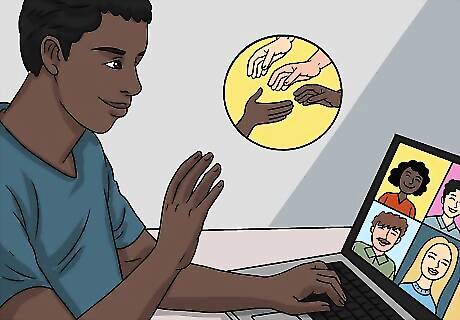
Look for local support. You can find local groups that meet regularly, organizations that put on periodic seminars or conventions, or even online groups that swap ideas and resources. Many groups set up co-op classes--taught by other parents--in a variety of subjects. If you start to feel overwhelmed, frustrated, or all alone in your family's educational pursuits, a support group can offer advice or just a reassuring acknowledgment from other parents that you are not alone. They are also an invaluable resource for tips on how to comply with the home education laws in your area. If you have any questions at all, a local support group should be your place to turn. And your child could meet other homeschoolers!

Gather supplies. Home education supplies vary greatly according to teaching method. You can order textbooks, boxed curricula, and learning tools online or at home-educating curriculum and supply sales. For cheaper alternatives, many home educators use libraries, used book stores, curriculum swaps, thrift stores, and garage sales. Back-to-school-sales at local discount stores or office supply stores are the perfect place to get some of the basic supplies like pens, notebooks and glue. Stock up in August and you'll last throughout the year.
As You Go

Plan your day. If you choose to have a more formal home education environment, you can prepare by gathering your lesson plans, materials, and textbooks together -- or even by setting up a room in your house for studies and activities. However you choose to home educate, it can only be helped by planning and preparing as much as you can before you start. A different approach might mean your preparation involves setting up field trips for the rest of the year in every subject, placing learning objects around your home, or simply getting yourself into a mindset of using every day as a learning opportunity with no set plans or textbooks.

Look for hands-on activities. Everyone benefits from seeing things firsthand. Some activities that can be educational as well as easy to do are: gardening, cooking, sewing, composting, science projects, hiking, fixing the house, caring for pets, and taking apart broken appliances (just make sure there are no lasers or dangerous electronic components still active). Your children will learn different things depending on their ages, but everyone will come away better educated. Make sure your activities are fact-filled and concept-checked. Planting flowers can be a learning activity -- or it can be an activity where a child got to play in the dirt. If you do do activities around the house, accompany it with a reading or other supplementary tool. Some kids naturally learn better through hands-on activities—they're known as "kinesthetic learners."
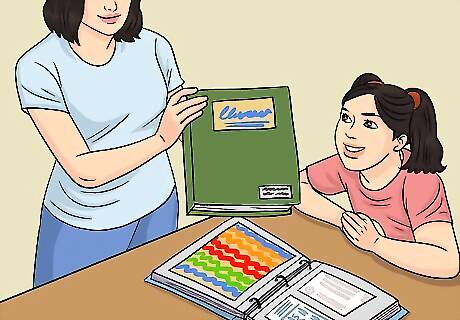
Keep a portfolio of each child's work. Thick, three-ringed binders with tab separators for each student are an excellent way to keep track of schoolwork, along with whatever may be required from a legal standpoint. Label each tab with whatever subjects you are studying. After your child has completed a page, punch holes (using a three-ring hole punch) and snap the page into the proper section of their book. Remember to date each page or it will be a big jigsaw puzzle to figure out later. This is especially useful if your child is thinking of going to college, as some schools require portfolios of work from homeschool students. And you could always use the materials for reference later for your next child or for your friends or relatives.

Go with your gut feelings. Trust your knowledge and instincts regarding your own children. You are not only the one ultimately responsible for guiding your children's education, but you are often the one person best able to recognize what they do or do not need. Turn to evaluations and insights from others to help guide you, but trust your own instincts about what your children need to learn and do in their educational progress. Questioning yourself is normal. You may feel like you do it all the time, especially when you first start. This is when your support group comes in handy and you should utilize the tools (like the Internet) you have at your disposal. Odds are you are just as qualified as the next parent who's doing it and have nothing to worry about.
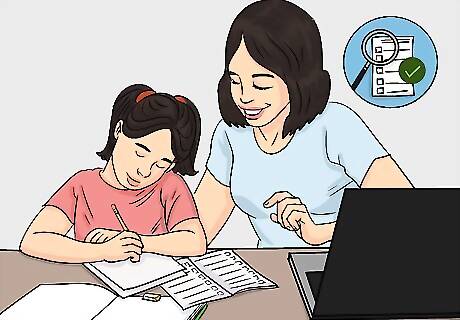
Periodically evaluate your progress. Progress evaluation happens naturally through the one-on-one process of home educating, although in some areas the law requires periodic formal testing or evaluation of home educators. Personal evaluation, however, should not only consider how your child is doing academically but also how the process is working for everyone in the family. If the teaching methods are a poor match with your child’s learning style, if the curriculum is too structured or not structured enough, or if the process of home educating seems to be making things worse rather than better, then it’s time for a change. Fortunately, change is something you can do fairly quickly with just a little research. If you feel uncomfortable with your level of knowledge on the subject, there are standardized progress tests (such as FCAT) that your child can take and then have the scores mailed to you, and you can find many other tests to order or take online.
Keeping Your Children in Mind
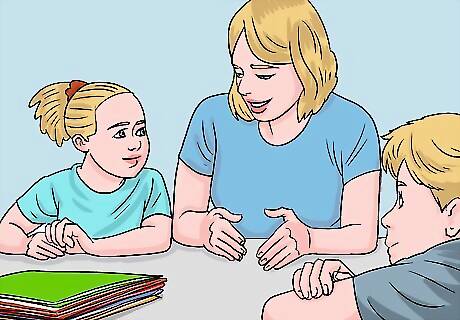
Prepare your younger children. Explain to them what is going to happen in the months to come, including how daily life will be structured for them and the rest of the family. Explain to older children that though they may be leaving their school, it doesn't mean they are leaving their education or their friends. Ask them what they would be interested in studying. For example, if they love stargazing, get a telescope and study astronomy. Be sure to get them excited. Home education should be fun for the students -- not a punishment. That's the best motivator. Encourage your child to take a personality test or learning assessment that helps narrow down their preferences and psychology. From there, try to plan activities based on their skills and talents. Some kids might be visual learners, and may benefit from lessons/classwork with photographs and visual representation. Other kids might be auditory learners, while others might be more hands-on. If it'll help them, let them know that they're one of 1.5 million (and rising) students that are going to learn from home this year.

Allow your tween or teenager plenty of time to adjust. Often children who leave the standard educational system for home education need some time to adjust. Instead of immediately jumping into "school at home," you may want to do unstructured activities and then slowly work into your routine. Determine how much "recovery time" is needed for each particular child, and work with them to create a different and more enjoyable learning experience. If they're concerned, do research and back up your opinions with others' opinions; they shouldn't think that this is some tyrannical decision on your part. If they think they'll be behind, let them know that this means they can start taking college courses earlier -- if anything, this will speed up their education process.

Don't lose your child's old connections, in addition to forming new ones. Encourage your child to stay in touch with friends they already have. You might encourage -- but do not force -- your child to become friends with another home-educated child as well. In many cases this will occur spontaneously if your family interacts with other homeschool families through co-op classes, field trips or homeschool sporting events. One of the best things about homeschooling is that it doesn't take 8 hours to teach your child. In fact, at a brick-and-mortar institution, they'd spend most of their time waiting. You may be able to get done in 4 hours what their old school could get done in 7. That means more time for you and more time for them to spend developing their selves.


















Comments
0 comment